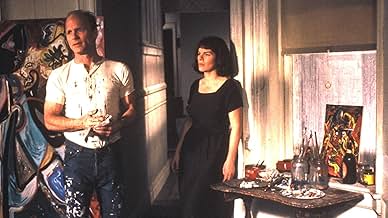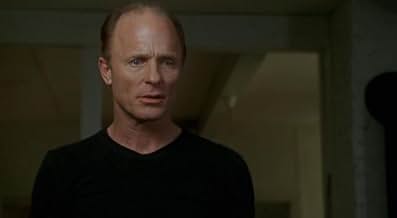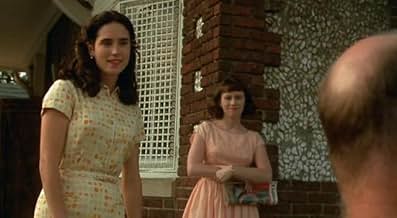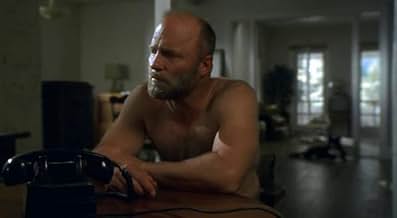AVALIAÇÃO DA IMDb
7,0/10
30 mil
SUA AVALIAÇÃO
Um filme sobre a vida e a carreira do pintor americano Jackson Pollock.Um filme sobre a vida e a carreira do pintor americano Jackson Pollock.Um filme sobre a vida e a carreira do pintor americano Jackson Pollock.
- Direção
- Roteiristas
- Artistas
- Ganhou 1 Oscar
- 3 vitórias e 10 indicações no total
Eulala Scheel
- Arloie's Baby
- (as Eulala Grace Harden)
Avaliações em destaque
Films like "Pollock" always leave me at a loss when I have to describe them to others. For one thing, it's long been a labor of love for director / star Ed Harris, which maybe causes me to have more sympathy for the picture than I should -- after all, I'd hate to ream a project that he's spent so much time and energy developing. For another thing, I usually find biopics a bit crippled because, in most cases ("Pollock" included), I already know the plot, and without the plot to get lost in, I'm left to look at little things like, you know, the acting, writing and directing. Lucky for Harris (and my conscience), then, that the acting is uniformly great, the direction is mostly seamless (and downright kinetic at times), and the writing, while not being great in the "Casablanca" sense of the word, serves the story well. "Pollock" dodges all the pitfalls that often turn biopics into boring history lessons.
The film picks up with Jackson Pollock the Unsuccessful Drunk (Harris), dabbling in surrealist painting and proclaiming Picasso to be a fraud. There's enough promise in his work, though, for him to gain a girlfriend, Lee Krasner (Marcia Gay Harden); a benefactor, Peggy Guggenheim (Amy Madigan); and a professional critic, Clement Greenberg (Jeffrey Tambor), who champions his work in print. From there we watch Pollock take the express train to art world superstardom, becoming one of the world's foremost abstract painters.
The fly in the ointment, though, is Pollock's notorious temper, aided and abetted by his equally notorious alcoholism. Life in New York City is doing his personal life no favors, so he and Krasner move to the countryside, and it's here that he stumbles upon his "drip method" of painting, granting him another wave of fame and recognition. It is this sequence, in which Pollock makes his pivotal discovery, where Harris's talent as a director comes to the fore. Although we're aware that we're watching an actor perform a discovery that was made by someone else more than fifty years ago, it's an exciting, dynamic moment as Harris dances around his canvas, flicking paint from his brush in a blur of motion. It doesn't come off as staged or phony, but as a moment of genuine discovery, and for those moments we might as well actually be watching Jackson Pollock revolutionize the art world.
From there, though, ego, alcohol, and the mechanics of change all prove to be Pollock's undoing, leading, of course, to his untimely demise. Through it all, Harris seethes with a feral intensity, giving a performance that should rightfully win him an Oscar (and check out the dramatic weight gain at the end. Tom who?). Harden, his co-nominee, is also excellent (although she's stuck uttering lines like, "You've done it, Pollock. You've cracked it wide open."). In lesser hands, Krasner could be just another version of the screeching, wailing, put-upon wife, but Harden bolsters the anguish with a fine layer of anger; the torment of a woman who loves the person causing her misery, but who is unwilling to let go of the principles which led her to enter and maintain the relationship on her own terms.
"Pollock" ultimately succeeds because we know how it will end, we clearly see how unpleasant and deluded the artist had become, and still we can't look away. Harris's labor of love serves as an auspicious debut for someone who, at this stage, seems just as skilled behind the camera as he is in front of it.
The film picks up with Jackson Pollock the Unsuccessful Drunk (Harris), dabbling in surrealist painting and proclaiming Picasso to be a fraud. There's enough promise in his work, though, for him to gain a girlfriend, Lee Krasner (Marcia Gay Harden); a benefactor, Peggy Guggenheim (Amy Madigan); and a professional critic, Clement Greenberg (Jeffrey Tambor), who champions his work in print. From there we watch Pollock take the express train to art world superstardom, becoming one of the world's foremost abstract painters.
The fly in the ointment, though, is Pollock's notorious temper, aided and abetted by his equally notorious alcoholism. Life in New York City is doing his personal life no favors, so he and Krasner move to the countryside, and it's here that he stumbles upon his "drip method" of painting, granting him another wave of fame and recognition. It is this sequence, in which Pollock makes his pivotal discovery, where Harris's talent as a director comes to the fore. Although we're aware that we're watching an actor perform a discovery that was made by someone else more than fifty years ago, it's an exciting, dynamic moment as Harris dances around his canvas, flicking paint from his brush in a blur of motion. It doesn't come off as staged or phony, but as a moment of genuine discovery, and for those moments we might as well actually be watching Jackson Pollock revolutionize the art world.
From there, though, ego, alcohol, and the mechanics of change all prove to be Pollock's undoing, leading, of course, to his untimely demise. Through it all, Harris seethes with a feral intensity, giving a performance that should rightfully win him an Oscar (and check out the dramatic weight gain at the end. Tom who?). Harden, his co-nominee, is also excellent (although she's stuck uttering lines like, "You've done it, Pollock. You've cracked it wide open."). In lesser hands, Krasner could be just another version of the screeching, wailing, put-upon wife, but Harden bolsters the anguish with a fine layer of anger; the torment of a woman who loves the person causing her misery, but who is unwilling to let go of the principles which led her to enter and maintain the relationship on her own terms.
"Pollock" ultimately succeeds because we know how it will end, we clearly see how unpleasant and deluded the artist had become, and still we can't look away. Harris's labor of love serves as an auspicious debut for someone who, at this stage, seems just as skilled behind the camera as he is in front of it.
a good film, though perhaps i was expecting a little more. The psyche of a troubled artist is somewhat predestined these days and maybe it is just that our assumptions are correct as they are all portrayed in a predictable way. If this is how the artist truly was then then Harris could have done nothing different, it just seems a little distant. I didn't feel at one with the artist, i couldn't sympathise with him or feel his pain. The 'intellectual' artistic debates and gendredising continuously used by his wive left me with no sympathy for her. She appears desperate from the first scene pretentiously trying to be involved with the next big thing. The most depressing part of this film is that two people can be stupid enough to waste their lives on each other without searching for the happiness which they truly seek. The emphasis is on Pollock as a man whereas i would like to see more of him as an artist, did his individual paintings have meaning or did he just do them out of hate for the world.... i guess i didn't feel you see his mind and its true agony's, maybe he was just generally mad at the world.
Really not a bad film for what it is, just to me it lacked true emotion.
sio
Really not a bad film for what it is, just to me it lacked true emotion.
sio
10L8nDA
Ed Harris has taken the biopic to a new level. Although the skeleton of the film is no more than the troubled life of an alcoholic struggling with fame, the power of the acting and sequence of the film take it a step further. The relationship between Krasner and Pollock mirrors that of Stanley and Stella Kowalski but Krasner is a much stronger character and Marcia Gay Harden more than deserved the oscar she received for the part. The only part that concerned me was the explanation Harris chose to show Pollock's progression to his drip paintings. The arbitrariness of the "revelation" seems stretched to me and suggests that it is actually known how Pollock made that movement. All in all, the movie is excellent and worth seeing.
Just be careful - I cringed every time he got into a car...
Just be careful - I cringed every time he got into a car...
I think it is very hard in general to make a "based on a true story" sort of film, that alone can clamp a pretty heavy anchor to your ankles. Moreso when that true story is one that means a lot to you as Ed Harris has said about Jackson Pollock's biography.
Based upon those precepts, I feel Harris succeeded, however I cannot say this film is an unqualified success. It is sprawling, but unlike Pollock...for cinema circulation, Harris could not stretch his canvas so wide. He gets over two hours here...but I suspect he could have filled six easily.
Based upon early buzz when this came out, including the snippet shown at the Oscars for Marcia Gay Harden, I had trepidation that this would be reduced to a shout and spittle film; that the rage and angst of Pollock and Krasner would be the story. Certainly this is one aspect presented, but not the sole one.
Interestingly to me, it seemed that the more halcyon Pollock's life was, the better his exploration of his art. I went in expecting that alcohol-oiled turmoil would be presented as the key to complicated creation. An artist must suffer and so on.
This shows that while I was familiar with Pollock, I was not that familiar. I could recognize his later chaotic, laced and dripped paintings...but I did not know anything about his personal life.
But in the course of two hours, I did enjoy...
1) Seeing a progression in Pollock's paintings. I had not seen many of his earlier works that had more blocks to them, that were more easily seen as assemblages of images. The way these were filmed, in the act of creation was well done here. Same is true for the latter works.
2) The importance of Pollock's family. I loved seeing his Mother come to the openings. I did not know that two other brothers also painted; Sande alone seems to understand Jackson's talent and torment. Their relationship could have made a film of its own.
3) Jeffrey Tambor's portrayal of Clem, a critic/king-maker of sorts. Us posters here, run the risk of being posers as well. And I think the best of us realize how subjective our comments are, a function of when we watch films, and who we are with, or how we are feeling as much as the films themselves.
4) Following on that notion, to me one thread of "Pollock" is how the circle of critics destroys artists with either persecution or praise. It is not a revelation, that much art is highly personal, both for the purveyor, but painfully so for the artists. Not a revelation, but still worth repeating...
When we see Pollock "drunk" on his ascent, reading from an Italian magazine during a family reunion, that really got to me. Maybe that was more dangerous than alcohol. Even if that critical acceptance is not essential, eating is. Another thread alluded to in this film, how to "work" and to live as an artist.
That scene also drove home the obsessive nature of being an artist, how it is hard at the same time to be a brother, or uncle, husband or perhaps impossible to be a father. Thus that obsession helps to contrast Sande and Jackson, and certainly sets up the power of Marcia Gay Harden's performance. Krasner too is an artist, who has had some success. She retains her name, and her dreams, but fully embraces Pollock, and Pollock's artwork. Her support of him, while aware of her limits, was presented without martyring her. She was not a saint wandering into Pollock's hell.
5) Talking to an artist about his/her obsession is problematic. They are already communicating in their chosen medium, and presumably they are communicating that way as it is easier than using words. I thought the interview with Life magazine in this film, and Pollock's notion of viewing his art as one views a field of flowers helped me. Maybe that was obvious to others, I think that way in music/sound...but in art too often I am hunting for images, for mirrors to our world.
The radio interview that Pollock conducted, halting and awkward could have underscored the travails of talking about art, or it seemed like he was trying to read from a manifesto of sorts (perhaps in real life one exists). Finally, the documentary film is painted as an undoing of Pollock. Fascinating as we ourselves are watching a film about Pollock. It's as if Ed Harris the actor in character could be talking to Ed Harris the film auteur.
The documentary film was to Pollock, what a zoo can be to a wild animal. The habitat corrupts the inhabitant. How Pollock puts on his shoes, when he's done painting, all control is lost...the private process made public, is made impure.
No, that's not the point to this film. If you are looking for a film with one tidy point, go elsewhere. But for an abridged but admirable biopic on Jackson Pollock, with many tangled and tantalizing threads...this is one to rent. And now a book for me to read. Rarely do I watch the deleted scenes and wish they had been in the film, as I did in this case.
There was a great shot early in the film where Pollock is pacing before the mural commissioned by Peggy Guggenheim. From the plot, we know he's worried about looms before him, and we get eerie shots of his shadow projected on the empty canvas to reinforce that. Harris too may have felt this was an ominous undertaking, I hope he pleased himself as he did me.
7/10
Based upon those precepts, I feel Harris succeeded, however I cannot say this film is an unqualified success. It is sprawling, but unlike Pollock...for cinema circulation, Harris could not stretch his canvas so wide. He gets over two hours here...but I suspect he could have filled six easily.
Based upon early buzz when this came out, including the snippet shown at the Oscars for Marcia Gay Harden, I had trepidation that this would be reduced to a shout and spittle film; that the rage and angst of Pollock and Krasner would be the story. Certainly this is one aspect presented, but not the sole one.
Interestingly to me, it seemed that the more halcyon Pollock's life was, the better his exploration of his art. I went in expecting that alcohol-oiled turmoil would be presented as the key to complicated creation. An artist must suffer and so on.
This shows that while I was familiar with Pollock, I was not that familiar. I could recognize his later chaotic, laced and dripped paintings...but I did not know anything about his personal life.
But in the course of two hours, I did enjoy...
1) Seeing a progression in Pollock's paintings. I had not seen many of his earlier works that had more blocks to them, that were more easily seen as assemblages of images. The way these were filmed, in the act of creation was well done here. Same is true for the latter works.
2) The importance of Pollock's family. I loved seeing his Mother come to the openings. I did not know that two other brothers also painted; Sande alone seems to understand Jackson's talent and torment. Their relationship could have made a film of its own.
3) Jeffrey Tambor's portrayal of Clem, a critic/king-maker of sorts. Us posters here, run the risk of being posers as well. And I think the best of us realize how subjective our comments are, a function of when we watch films, and who we are with, or how we are feeling as much as the films themselves.
4) Following on that notion, to me one thread of "Pollock" is how the circle of critics destroys artists with either persecution or praise. It is not a revelation, that much art is highly personal, both for the purveyor, but painfully so for the artists. Not a revelation, but still worth repeating...
When we see Pollock "drunk" on his ascent, reading from an Italian magazine during a family reunion, that really got to me. Maybe that was more dangerous than alcohol. Even if that critical acceptance is not essential, eating is. Another thread alluded to in this film, how to "work" and to live as an artist.
That scene also drove home the obsessive nature of being an artist, how it is hard at the same time to be a brother, or uncle, husband or perhaps impossible to be a father. Thus that obsession helps to contrast Sande and Jackson, and certainly sets up the power of Marcia Gay Harden's performance. Krasner too is an artist, who has had some success. She retains her name, and her dreams, but fully embraces Pollock, and Pollock's artwork. Her support of him, while aware of her limits, was presented without martyring her. She was not a saint wandering into Pollock's hell.
5) Talking to an artist about his/her obsession is problematic. They are already communicating in their chosen medium, and presumably they are communicating that way as it is easier than using words. I thought the interview with Life magazine in this film, and Pollock's notion of viewing his art as one views a field of flowers helped me. Maybe that was obvious to others, I think that way in music/sound...but in art too often I am hunting for images, for mirrors to our world.
The radio interview that Pollock conducted, halting and awkward could have underscored the travails of talking about art, or it seemed like he was trying to read from a manifesto of sorts (perhaps in real life one exists). Finally, the documentary film is painted as an undoing of Pollock. Fascinating as we ourselves are watching a film about Pollock. It's as if Ed Harris the actor in character could be talking to Ed Harris the film auteur.
The documentary film was to Pollock, what a zoo can be to a wild animal. The habitat corrupts the inhabitant. How Pollock puts on his shoes, when he's done painting, all control is lost...the private process made public, is made impure.
No, that's not the point to this film. If you are looking for a film with one tidy point, go elsewhere. But for an abridged but admirable biopic on Jackson Pollock, with many tangled and tantalizing threads...this is one to rent. And now a book for me to read. Rarely do I watch the deleted scenes and wish they had been in the film, as I did in this case.
There was a great shot early in the film where Pollock is pacing before the mural commissioned by Peggy Guggenheim. From the plot, we know he's worried about looms before him, and we get eerie shots of his shadow projected on the empty canvas to reinforce that. Harris too may have felt this was an ominous undertaking, I hope he pleased himself as he did me.
7/10
Jackson Pollock (Ed Harris) is famous with a Life magazine cover in 1950. The movie flashes back to 1941. He's a drunk staying in Greenwich Village with his brother and pregnant wife. Artist Lee Krasner (Marcia Gay Harden) shows some interest and becomes his lover/supporter. His brother moves to Connecticut. Jackson breaks down which is why he can't be drafted into the war. Lee takes Jackson home acting more and more like his manager. His work eventually gains the attention of art collector Peggy Guggenheim (Amy Madigan) who gives him an one-man show in 1943. Lee and Jackson decides to move to a country house on Long Island away from the drinking and doing more work. His paintings are still not selling and then the Life article happens. Lee and Jackson have a roller-coaster relationship and then he has an affair with Ruth Kligman (Jennifer Connelly).
Ed Harris directs a mostly straight forward biopic of Jackson Pollock with a few fascinating scenes of painting sessions. His directing style doesn't necessarily project Jackson mental breakdowns but his acting is able to bridge the gap. Ed Harris is not the most imaginative director visually but it is overcome by good actors doing good work. It is a good debut directorial effort.
Ed Harris directs a mostly straight forward biopic of Jackson Pollock with a few fascinating scenes of painting sessions. His directing style doesn't necessarily project Jackson mental breakdowns but his acting is able to bridge the gap. Ed Harris is not the most imaginative director visually but it is overcome by good actors doing good work. It is a good debut directorial effort.
Você sabia?
- CuriosidadesEd Harris's father, Bob L. Harris, bought his son a book about Jackson Pollock simply because he felt Ed bore a strong resemblance to the painter. Ever since then, Ed Harris became fascinated with Pollock's life.
- Erros de gravaçãoWhen the photographer is making the movie of Pollock, he "zooms" in on the shoes. But the old 16 mm camera he is using has a turret with three fixed lenses; thus, he should not be able to zoom. All his other shots are as expected from fixed lenses of different focal lengths.
- Citações
Jackson Pollock: If people would just look at the paintings, I don't think they would have any trouble enjoying them. It's like looking at a bed of flowers, you don't tear your hair out over what it means.
- Trilhas sonorasThe Mighty Blues
Improvisation
Performed by The Port of Harlem Jazzmen
Courtesy of Blue Note Records
By Arrangement with EMI Capitol Music Special Markets
Principais escolhas
Faça login para avaliar e ver a lista de recomendações personalizadas
- How long is Pollock?Fornecido pela Alexa
Detalhes
- Data de lançamento
- País de origem
- Central de atendimento oficial
- Idioma
- Também conhecido como
- Поллок
- Locações de filme
- Empresas de produção
- Consulte mais créditos da empresa na IMDbPro
Bilheteria
- Orçamento
- US$ 6.000.000 (estimativa)
- Faturamento bruto nos EUA e Canadá
- US$ 8.598.593
- Fim de semana de estreia nos EUA e Canadá
- US$ 44.244
- 17 de dez. de 2000
- Faturamento bruto mundial
- US$ 10.994.533
- Tempo de duração2 horas 2 minutos
- Cor
- Mixagem de som
- Proporção
- 1.85 : 1
Contribua para esta página
Sugerir uma alteração ou adicionar conteúdo ausente

































